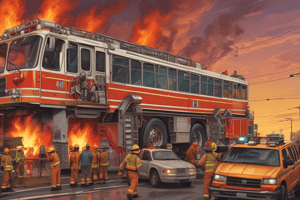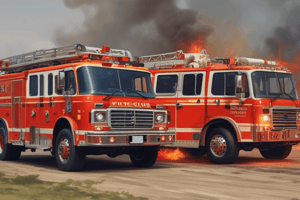Podcast
Questions and Answers
What action did Louis XVI take without consulting the Assembly leaders?
What action did Louis XVI take without consulting the Assembly leaders?
- Dismissal of Necker, his minister of finance (correct)
- Establishing some form of constitutional monarchy
- Mustering royal troops near Versailles and Paris
- Contemplating the use of force against the National Constituent Assembly
What was the staple food of the poor in Paris during the winter and spring of 1789?
What was the staple food of the poor in Paris during the winter and spring of 1789?
- Rice
- Corn
- Bread (correct)
- Potatoes
Who did the king decide to throw in his lot with against the emerging forces of reform?
Who did the king decide to throw in his lot with against the emerging forces of reform?
- Populace of Paris
- National Constituent Assembly
- Reformist politicians
- Conservative aristocracy (correct)
What did most of the National Constituent Assembly wish to establish?
What did most of the National Constituent Assembly wish to establish?
What natural rights were proclaimed in the Declaration of the Rights of Man and Citizen?
What natural rights were proclaimed in the Declaration of the Rights of Man and Citizen?
What was the main demand of the Parisian Women's March on Versailles?
What was the main demand of the Parisian Women's March on Versailles?
What did the National Constituent Assembly aim to achieve through reorganizing France?
What did the National Constituent Assembly aim to achieve through reorganizing France?
Who could vote according to the Constitution of 1791?
Who could vote according to the Constitution of 1791?
What did the Assembly aim to protect and limit through its principles?
What did the Assembly aim to protect and limit through its principles?
What influenced the nineteenth-century liberals across Europe according to the text?
What influenced the nineteenth-century liberals across Europe according to the text?
What did the Declaration of the Rights of Man and Citizen emphasize?
What did the Declaration of the Rights of Man and Citizen emphasize?
What did the Constitution of 1791 establish?
What did the Constitution of 1791 establish?
What was the response of the king to the Parisian Women's March on Versailles?
What was the response of the king to the Parisian Women's March on Versailles?
What did the Declaration of the Rights of Man and Citizen specifically apply to?
What did the Declaration of the Rights of Man and Citizen specifically apply to?
What type of monarchy did the National Constituent Assembly pursue?
What type of monarchy did the National Constituent Assembly pursue?
What did the National Constituent Assembly reject?
What did the National Constituent Assembly reject?
Which group of people were excluded from voting and holding office during the French Revolution?
Which group of people were excluded from voting and holding office during the French Revolution?
What did the National Assembly do with the land and property of the Roman Catholic Church in France?
What did the National Assembly do with the land and property of the Roman Catholic Church in France?
What did the Chapelier Law forbid in 1791?
What did the Chapelier Law forbid in 1791?
What did the National Constituent Assembly do with ancient French provinces?
What did the National Constituent Assembly do with ancient French provinces?
What did Olympe de Gouges demand in her Declaration of the Rights of Woman in 1791?
What did Olympe de Gouges demand in her Declaration of the Rights of Woman in 1791?
What did the National Constituent Assembly do with the grain trade?
What did the National Constituent Assembly do with the grain trade?
What did the National Assembly do with the ancient judicial courts in France?
What did the National Assembly do with the ancient judicial courts in France?
What did the Assembly do with the metric system?
What did the Assembly do with the metric system?
What did the National Assembly do with workers' associations through the Chapelier Law?
What did the National Assembly do with workers' associations through the Chapelier Law?
What did the Assembly do with assignats in December 1789?
What did the Assembly do with assignats in December 1789?
What did the National Assembly do with the value of assignats?
What did the National Assembly do with the value of assignats?
What did the National Assembly do with the power structure in France?
What did the National Assembly do with the power structure in France?
What was the main consequence of the issuance of assignats by the National Constituent Assembly?
What was the main consequence of the issuance of assignats by the National Constituent Assembly?
What was the outcome of the Civil Constitution of the Clergy's transformation of the Roman Catholic Church in France?
What was the outcome of the Civil Constitution of the Clergy's transformation of the Roman Catholic Church in France?
Who condemned the Civil Constitution of the Clergy and the Declaration of the Rights of Man and Citizen, initiating a Roman Catholic offensive against the revolution?
Who condemned the Civil Constitution of the Clergy and the Declaration of the Rights of Man and Citizen, initiating a Roman Catholic offensive against the revolution?
Who were the émigrés and what was their action in response to the revolution?
Who were the émigrés and what was their action in response to the revolution?
What was the significance of the king's attempted flight to Varennes in June 1791?
What was the significance of the king's attempted flight to Varennes in June 1791?
What did the leaders of the National Constituent Assembly announce as a public fiction regarding the king's situation?
What did the leaders of the National Constituent Assembly announce as a public fiction regarding the king's situation?
Who issued the Declaration of Pillnitz, promising to intervene in France to protect the royal family and preserve the monarchy?
Who issued the Declaration of Pillnitz, promising to intervene in France to protect the royal family and preserve the monarchy?
How did the revolutionaries perceive the Declaration of Pillnitz?
How did the revolutionaries perceive the Declaration of Pillnitz?
What was the purpose of issuing assignats by the National Constituent Assembly?
What was the purpose of issuing assignats by the National Constituent Assembly?
What was the impact of the Civil Constitution of the Clergy on the Roman Catholic Church in France?
What was the impact of the Civil Constitution of the Clergy on the Roman Catholic Church in France?
Who condemned the Civil Constitution of the Clergy and the Declaration of the Rights of Man and Citizen?
Who condemned the Civil Constitution of the Clergy and the Declaration of the Rights of Man and Citizen?
What did the émigrés, including the king's younger brother, the count of Artois, do after leaving France?
What did the émigrés, including the king's younger brother, the count of Artois, do after leaving France?
What was the consequence of the king's attempted flight to Varennes in June 1791?
What was the consequence of the king's attempted flight to Varennes in June 1791?
What did the leaders of the National Constituent Assembly announce about the king's situation?
What did the leaders of the National Constituent Assembly announce about the king's situation?
What did Emperor Leopold II of Austria and King Frederick William II of Prussia promise in the Declaration of Pillnitz?
What did Emperor Leopold II of Austria and King Frederick William II of Prussia promise in the Declaration of Pillnitz?
How did the revolutionaries in France perceive the Declaration of Pillnitz?
How did the revolutionaries in France perceive the Declaration of Pillnitz?
Flashcards are hidden until you start studying
Study Notes
French Revolution: Key Events and Reactions
- The National Constituent Assembly issued assignats, initially limited, but later increased to liquidate national debt and create new property owners, resulting in inflation and stress on the urban poor.
- The Civil Constitution of the Clergy transformed the Roman Catholic Church in France, reducing the number of bishoprics and making pastors and bishops state employees, leading to immense opposition and a crisis of conscience among Catholics.
- Pope Pius VI condemned the Civil Constitution of the Clergy and the Declaration of the Rights of Man and Citizen, marking the beginning of a Roman Catholic offensive against the revolution.
- Aristocrats, known as émigrés, left France to foment counterrevolution, with the king's younger brother, the count of Artois, among the important figures.
- The king's attempted flight to Varennes in June 1791 was recognized, halting the escape and leading to profound distrust in the political scene.
- The leaders of the National Constituent Assembly announced a public fiction that the king had been abducted from the capital, signaling the fragility of the constitutional monarchy.
- Under pressure from émigrés, Emperor Leopold II of Austria and King Frederick William II of Prussia issued the Declaration of Pillnitz, promising to intervene in France to protect the royal family and preserve the monarchy.
- The Declaration of Pillnitz was taken seriously in France, as revolutionaries saw the nation surrounded by aristocratic and monarchical foes seeking to undo the revolution's accomplishments.
Studying That Suits You
Use AI to generate personalized quizzes and flashcards to suit your learning preferences.



